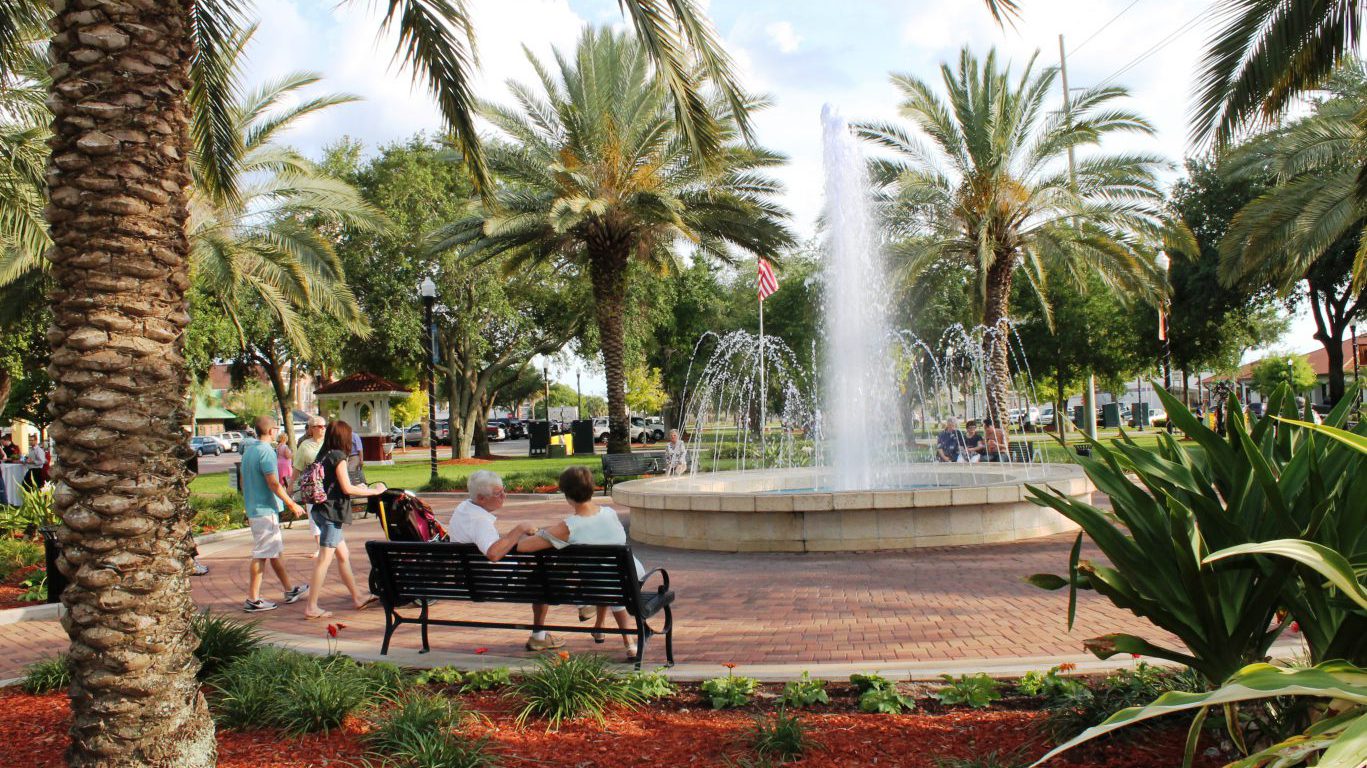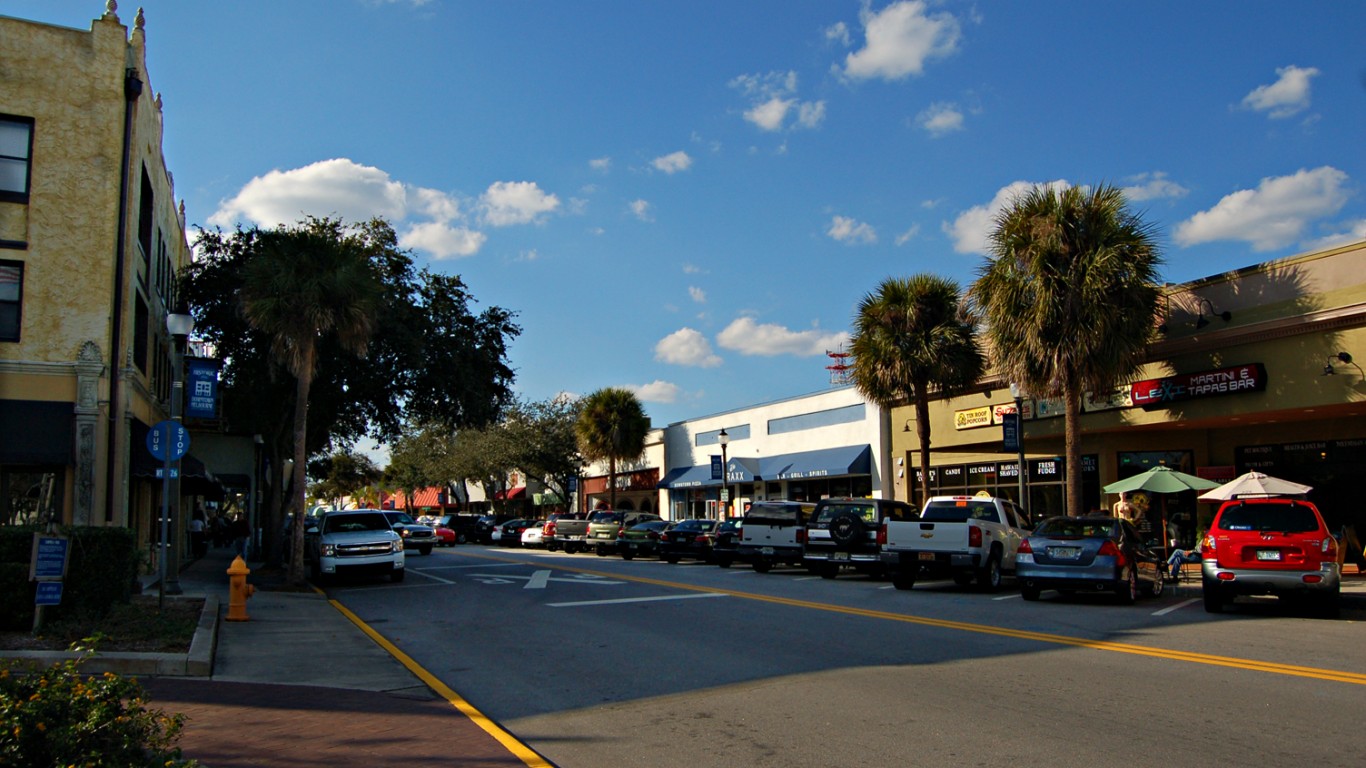
24/7 Wall St. Insights
- Nationwide, the cost of living tends to be higher in cities than in places outside of major metro areas
- Still, consumer prices can vary considerably from one city to another, and some Florida metro areas are more affordable for a broader range of incomes than others
- Also: 2 Dividend Legends To Hold Forever
The cost of living has skyrocketed across the United States in recent years — and rising prices are weighing heavily on the minds and pocketbooks of American families. According to a recent survey conducted by the U.S. Census Bureau, more than 57% of American households have had at least some difficulty affording their usual expenses in the last week, and over 93% of American adults reported stress related to higher prices in the last two months.
The rate of inflation began to surge in early 2021, and ultimately peaked in June 2022, when the price of goods and services were 9.1% higher than they were 12 months earlier, according to the Consumer Price Index. While inflation has cooled in the last two years, the CPI remains above the Federal Reserve’s target rate of 2%.
While no one was spared from rising consumer prices, in relative terms, the overall cost of living varies considerably across the country. In Florida, for example, goods and services were about 2.1% more expensive, on average, than they were nationwide in 2022 — the latest year of available data. Likely due in part to a higher cost of living, 59.9% of Florida households had difficulty paying for household expenses in the last week, and 95.7% of adults in the state reported stress resulting from rising prices. (Here is a look at the most expensive states to live in.)
Generally, Americans living in major cities are saddled with a higher cost of living than those in smaller, rural communities. According to the Bureau of Economic Analysis, goods and services are about 11.4% more expensive within U.S. metro areas than they are outside of metro areas.
In keeping with this pattern, goods and services are only about 2.4% more expensive than average across all 22 Florida metro areas, and 6.9% less expensive in non-metro areas. Still, the overall cost of living can vary meaningfully between one Florida city and another. In the state’s least expensive metro area, consumer prices are about 9.8% lower than they are nationwide on average. Meanwhile, in the state’s most expensive city, prices are 11.5% higher than average. (Here is a look at the most affordable town in every state.)
Consumer prices tend to rise when demand for goods and services outpaces supply. Because cost of living is closely tied to consumer spending, it is no coincidence that more affluent areas are typically more expensive places to live than lower income communities. While there are exceptions, the median household income in many of the most expensive cities on this list is higher than the comparable statewide median income of $69,303.
This is the cost of living in every Florida metro area, ranked.
Why It Matters

Inflation, as measured by the Consumer Price Index, hit a multi-decade high in 2022, and as of July 2024, the CPI remains well above the Federal Reserve’s 2% target. Even though prices tend to be far higher in cities than in rural communities, the vast majority of Americans — 80% according to the U.S. Census Bureau — live in an urban area. Still, consumer prices can vary considerably from one city to another, and some Florida metro areas are more affordable for a broader range of incomes than others.
22. Sebring-Avon Park, FL
- Overall cost of living, 2022: 9.8% lower than U.S. average
- Median household income, 2022: $52,799 ($16,504 less than statewide median)
- Median home value, 2022: $176,900 ($177,200 less than statewide median)
- Metro area population: 105,618
21. The Villages, FL

- Overall cost of living, 2022: 8.6% lower than U.S. average
- Median household income, 2022: $73,391 ($4,088 more than statewide median)
- Median home value, 2022: $367,200 ($13,100 more than statewide median)
- Metro area population: 144,970
20. Ocala, FL

- Overall cost of living, 2022: 5.9% lower than U.S. average
- Median household income, 2022: $54,190 ($15,113 less than statewide median)
- Median home value, 2022: $243,200 ($110,900 less than statewide median)
- Metro area population: 396,415
19. Tallahassee, FL

- Overall cost of living, 2022: 5.5% lower than U.S. average
- Median household income, 2022: $58,018 ($11,285 less than statewide median)
- Median home value, 2022: $259,400 ($94,700 less than statewide median)
- Metro area population: 391,680
18. Homosassa Springs, FL
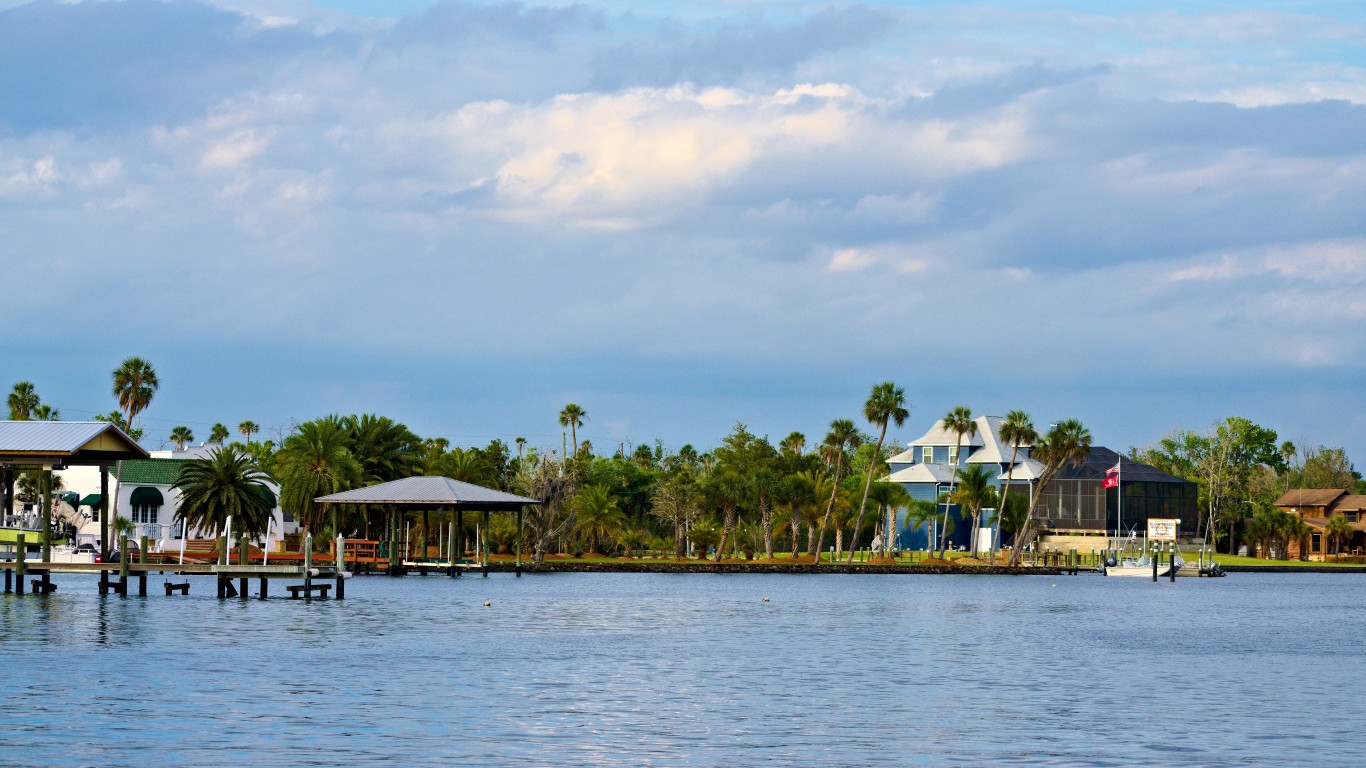
- Overall cost of living, 2022: 5.2% lower than U.S. average
- Median household income, 2022: $51,532 ($17,771 less than statewide median)
- Median home value, 2022: $239,700 ($114,400 less than statewide median)
- Metro area population: 162,529
17. Sebastian-Vero Beach, FL
- Overall cost of living, 2022: 4.6% lower than U.S. average
- Median household income, 2022: $67,407 ($1,896 less than statewide median)
- Median home value, 2022: $344,400 ($9,700 less than statewide median)
- Metro area population: 167,352
16. Pensacola-Ferry Pass-Brent, FL
- Overall cost of living, 2022: 4.5% lower than U.S. average
- Median household income, 2022: $68,034 ($1,269 less than statewide median)
- Median home value, 2022: $285,700 ($68,400 less than statewide median)
- Metro area population: 523,146
15. Punta Gorda, FL
- Overall cost of living, 2022: 4.0% lower than U.S. average
- Median household income, 2022: $64,860 ($4,443 less than statewide median)
- Median home value, 2022: $342,700 ($11,400 less than statewide median)
- Metro area population: 202,661
14. Lakeland-Winter Haven, FL
- Overall cost of living, 2022: 3.8% lower than U.S. average
- Median household income, 2022: $62,051 ($7,252 less than statewide median)
- Median home value, 2022: $267,500 ($86,600 less than statewide median)
- Metro area population: 787,404
13. Gainesville, FL

- Overall cost of living, 2022: 3.6% lower than U.S. average
- Median household income, 2022: $59,516 ($9,787 less than statewide median)
- Median home value, 2022: $264,500 ($89,600 less than statewide median)
- Metro area population: 350,903
12. Panama City, FL

- Overall cost of living, 2022: 2.5% lower than U.S. average
- Median household income, 2022: $66,245 ($3,058 less than statewide median)
- Median home value, 2022: $312,800 ($41,300 less than statewide median)
- Metro area population: 185,134
11. Crestview-Fort Walton Beach-Destin, FL
- Overall cost of living, 2022: 2.1% lower than U.S. average
- Median household income, 2022: $76,945 ($7,642 more than statewide median)
- Median home value, 2022: $358,800 ($4,700 more than statewide median)
- Metro area population: 299,786
10. Port St. Lucie, FL
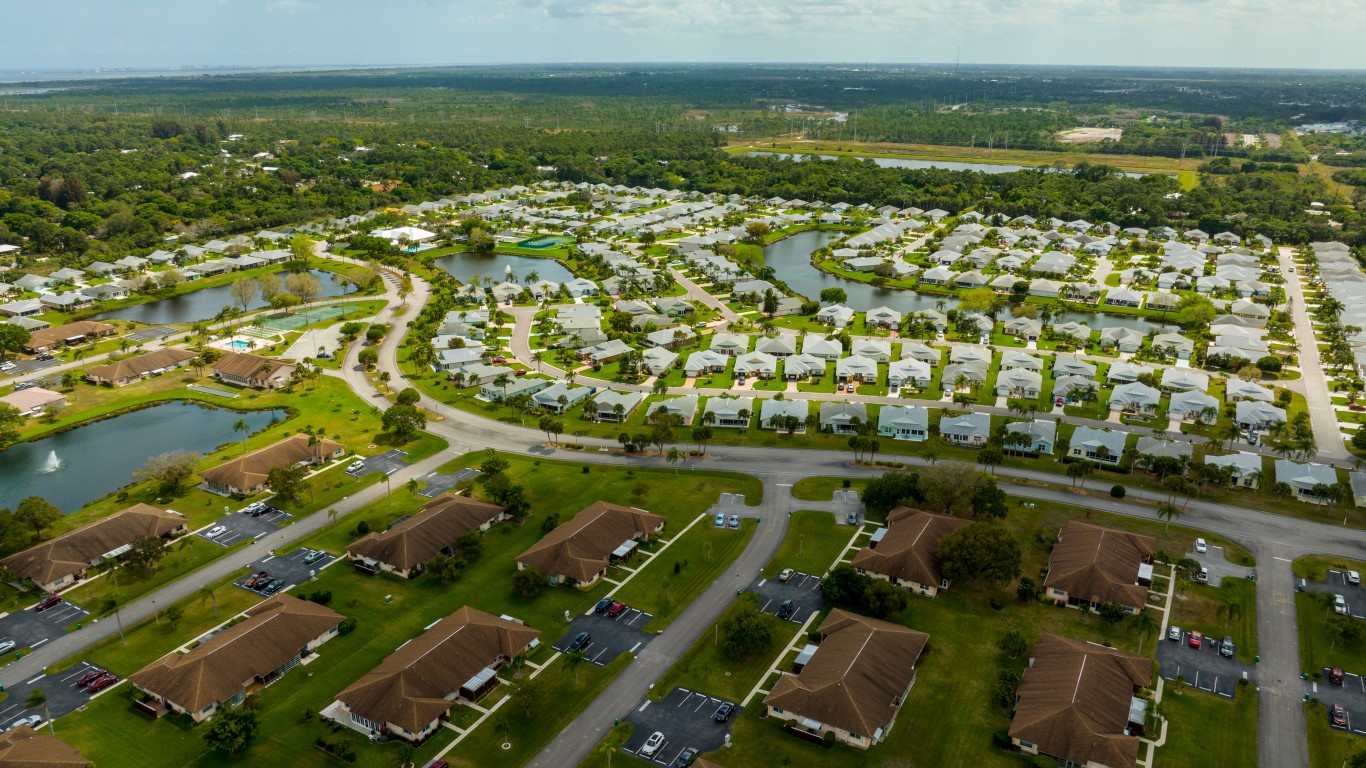
- Overall cost of living, 2022: 1.7% lower than U.S. average
- Median household income, 2022: $68,460 ($843 less than statewide median)
- Median home value, 2022: $363,600 ($9,500 more than statewide median)
- Metro area population: 520,710
9. Jacksonville, FL

- Overall cost of living, 2022: 1.5% lower than U.S. average
- Median household income, 2022: $77,583 ($8,280 more than statewide median)
- Median home value, 2022: $347,000 ($7,100 less than statewide median)
- Metro area population: 1,675,668
8. Deltona-Daytona Beach-Ormond Beach, FL
- Overall cost of living, 2022: 1.2% lower than U.S. average
- Median household income, 2022: $65,889 ($3,414 less than statewide median)
- Median home value, 2022: $320,200 ($33,900 less than statewide median)
- Metro area population: 705,897
7. Palm Bay-Melbourne-Titusville, FL
- Overall cost of living, 2022: 0.7% lower than U.S. average
- Median household income, 2022: $75,320 ($6,017 more than statewide median)
- Median home value, 2022: $336,800 ($17,300 less than statewide median)
- Metro area population: 630,693
6. Tampa-St. Petersburg-Clearwater, FL

- Overall cost of living, 2022: 0.3% lower than U.S. average
- Median household income, 2022: $69,290 ($13 less than statewide median)
- Median home value, 2022: $344,400 ($9,700 less than statewide median)
- Metro area population: 3,290,730
5. Orlando-Kissimmee-Sanford, FL

- Overall cost of living, 2022: 0.4% higher than U.S. average
- Median household income, 2022: $71,857 ($2,554 more than statewide median)
- Median home value, 2022: $361,100 ($7,000 more than statewide median)
- Metro area population: 2,764,182
4. North Port-Sarasota-Bradenton, FL

- Overall cost of living, 2022: 1.4% higher than U.S. average
- Median household income, 2022: $75,631 ($6,328 more than statewide median)
- Median home value, 2022: $402,600 ($48,500 more than statewide median)
- Metro area population: 891,411
3. Cape Coral-Fort Myers, FL

- Overall cost of living, 2022: 1.7% higher than U.S. average
- Median household income, 2022: $71,072 ($1,769 more than statewide median)
- Median home value, 2022: $361,400 ($7,300 more than statewide median)
- Metro area population: 822,453
2. Naples-Marco Island, FL
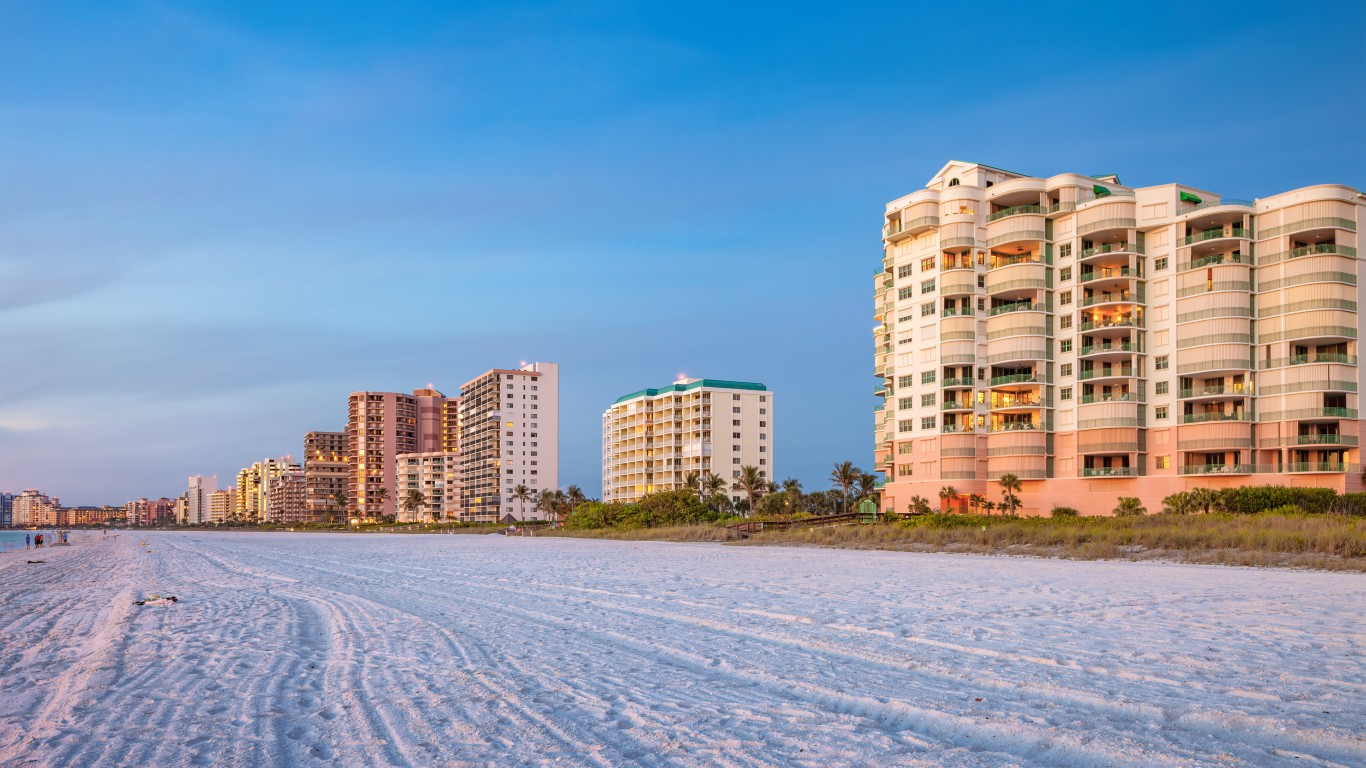
- Overall cost of living, 2022: 2.5% higher than U.S. average
- Median household income, 2022: $80,815 ($11,512 more than statewide median)
- Median home value, 2022: $541,500 ($187,400 more than statewide median)
- Metro area population: 397,994
1. Miami-Fort Lauderdale-Pompano Beach, FL
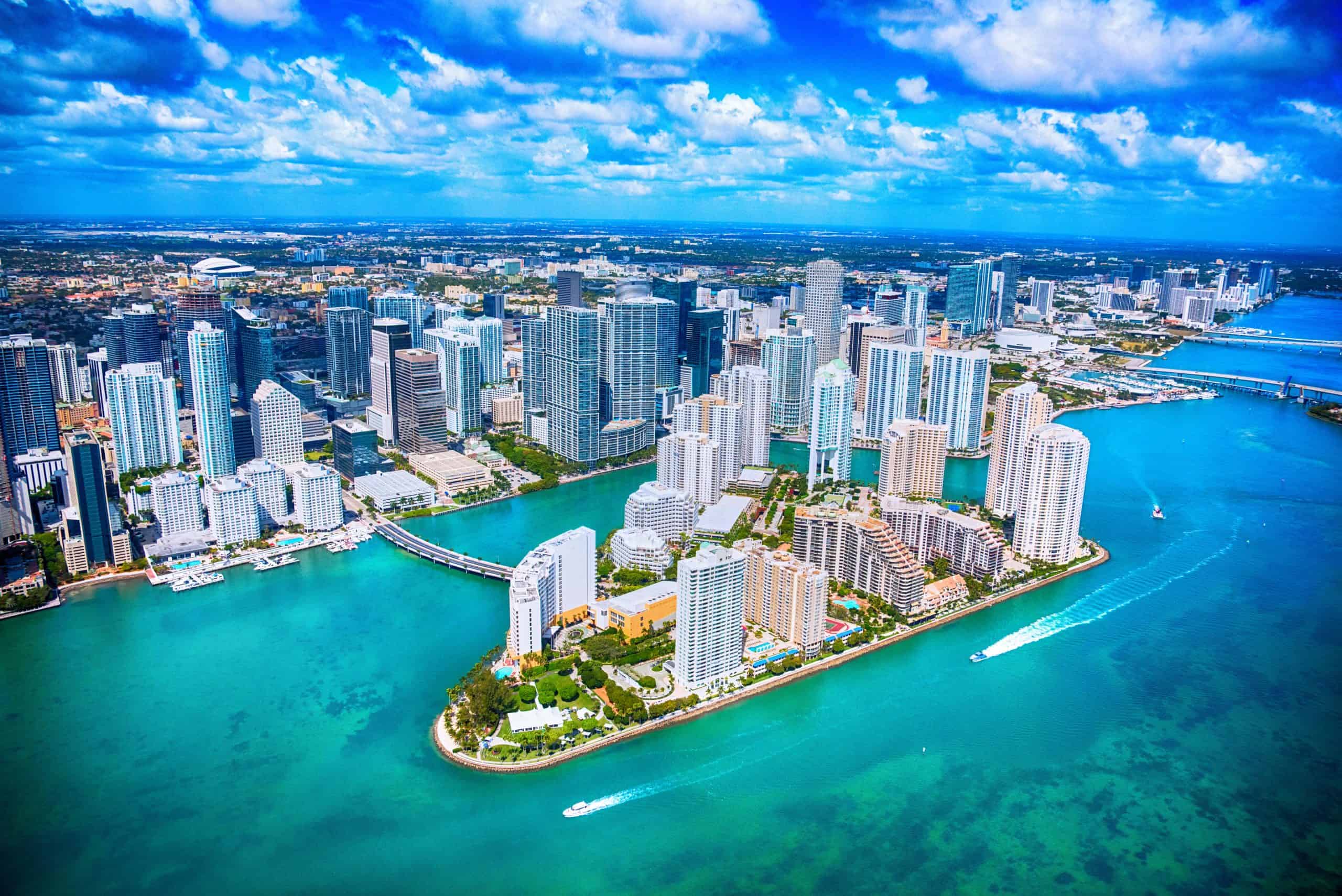
- Overall cost of living, 2022: 11.5% higher than U.S. average
- Median household income, 2022: $70,769 ($1,466 more than statewide median)
- Median home value, 2022: $429,800 ($75,700 more than statewide median)
- Metro area population: 6,139,340
It’s Your Money, Your Future—Own It (sponsor)
Are you ahead, or behind on retirement? For families with more than $500,000 saved for retirement, finding a financial advisor who puts your interest first can be the difference, and today it’s easier than ever. SmartAsset’s free tool matches you with up to three fiduciary financial advisors who serve your area in minutes. Each advisor has been carefully vetted and must act in your best interests. Start your search now.
If you’ve saved and built a substantial nest egg for you and your family, don’t delay; get started right here and help your retirement dreams become a retirement reality.
Thank you for reading! Have some feedback for us?
Contact the 24/7 Wall St. editorial team.
